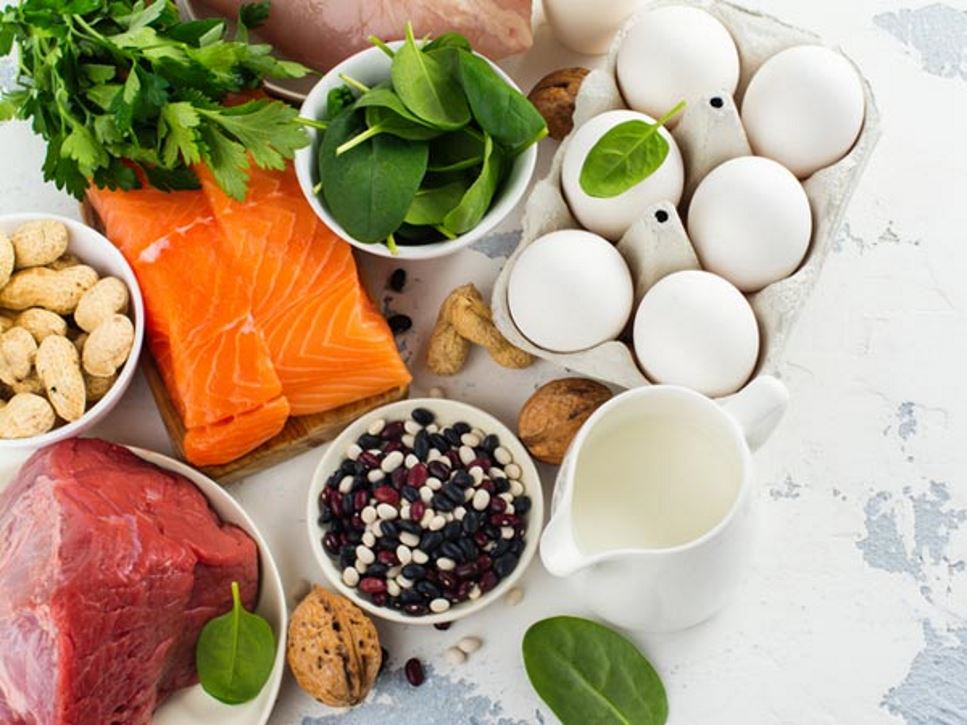There are eight well-known B vitamins that play a role in the body. They support metabolism and contribute to the body's ability to produce energy from food. Several of the B vitamins have additional functions as well:
Vitamin B6
This vitamin may alternatively be listed as “pyridoxine” when found in supplements. Vitamin B6 plays a role in metabolism, helps the immune system function and is essential for a healthy nervous system. Vitamin B6 is found in many foods, including beans, chicken, bananas, potatoes, pork, fish and fortified breakfast cereals.
Folate
Also known as B9, or more commonly, folic acid when found in supplement form or enriched foods, folate is an essential nutrient involved in protein and vitamin metabolism and the development of genetic material. Folate also is particularly important during pregnancy.
Consuming adequate amounts of folate (or folic acid) before and during pregnancy helps to reduce the risk of spine and brain deformities (known as neural tube defects) such as spina bifida. This nutrient also is key in decreasing risk of pregnancy complications such as anemia, preterm birth, congenital heart defects and oral cleft palates. In addition to obtaining folate from natural sources, it is recommended that anyone capable of becoming pregnant consume 400 to 800 micrograms of folic acid daily either from fortified foods and/or supplements.
Folate can be found in many foods such as beef liver, kidney beans, black-eyed peas and a variety of other vegetables — including broccoli, avocado, Brussels sprouts and spinach. Folic acid is found in enriched grains, such as breads and pasta, fortified breakfast cereals and dietary supplements.
Food alone may not provide adequate folate for people of reproductive age. For individuals planning to become pregnant, it's important to eat a folate-rich diet and take folic acid supplements at least one month before conception and continuing throughout pregnancy. Be sure to discuss taking any dietary supplements with a registered dietitian nutritionist or other health care provider.
Vitamin B12
Cobalamin, or vitamin B12, plays an important role in creating new red blood cells, and a deficiency could result in a type of anemia. The body’s ability to absorb vitamin B12 can decrease with age or be affected by certain medications, so older adults may not get enough of this important nutrient. Vitamin B12 is present in animal products including meat, fish, poultry, eggs and dairy foods, such as milk, yogurt and cheese. Some breakfast cereals and nutritional yeast also are fortified with vitamin B12 and can be an important source of this vitamin for vegetarians and vegans. A vitamin B12 supplement may be needed for some individuals.
Other B Vitamins
These B vitamins are more commonly known by their names than by their numbers, but all are widely available in a variety of foods and deficiency is relatively uncommon in the United States. Here is a list of food sources:
- Thiamin: Pork, trout, whole-grain and enriched-grain products including bread, rice, pasta, tortillas and fortified cereals
- Riboflavin: Milk, cheese, yogurt, enriched grains, lean meats, eggs, almonds and mushrooms
- Niacin: High-protein foods such as peanut butter, beef, poultry and fish, as well as enriched and fortified grain products
- Pantothenic Acid: Yogurt, sweet potatoes, milk, avocado, corn and eggs
- Biotin: Eggs, pork salmon and mushrooms are good sources, but lesser amounts can also be found in nuts, seeds and certain vegetables such as sweet potatoes
Find a Nutrition Expert
Looking for credible nutrition information and recommendations? The Academy of Nutrition and Dietetics' network of credentialed food and nutrition practitioners are ready to help!

